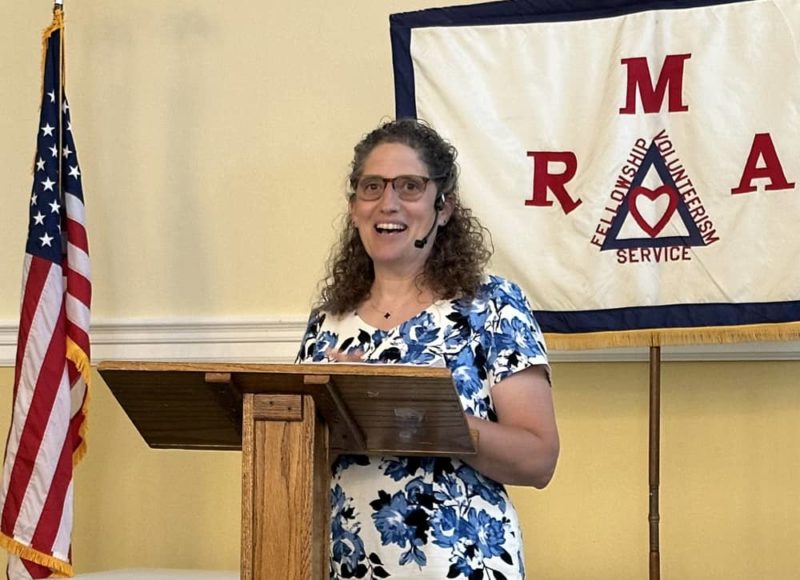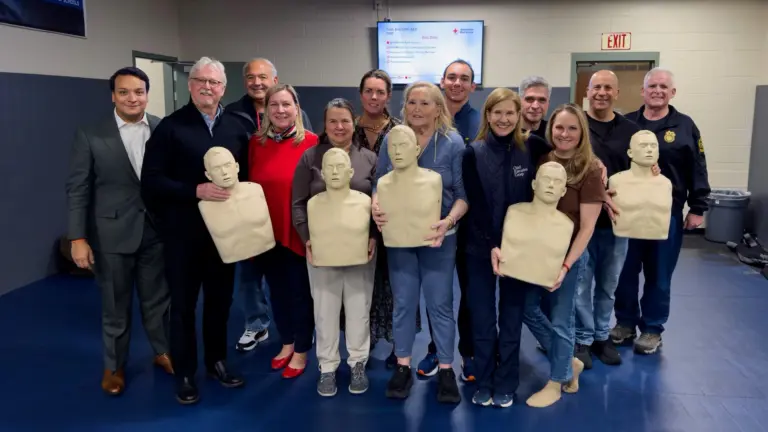
By Mike Abrahams
Horst Tebbe introduced the Retired Men’s Association June 26 speaker, Alexis Voulgaris, moderator of the Greenwich Representative Town Meeting (RTM), speaking on the topic “Greenwich RTM: A Unique Form of Local Government.” Alexis has been a member of the RTM since 2005. She is a representative from District 6, and prior to that was a licensed social worker. She provided an insightful presentation on this distinctive form of local government. The RTM, established in 1933, serves as Greenwich’s legislative body, comprising 230 members across 12 districts.
She first looked at the RTM’s historical context and structure. The RTM emerged from the New England town meeting tradition, transitioning from an open-to-all system to a representative one due to the growing population. This change aimed to maintain fair representation while adapting to demographic shifts. The concept was carefully studied before implementation in Greenwich, with a committee appointed in 1931 to analyze its feasibility. The first RTM election in 1933 saw high engagement, a trait that is also seen in the present day. In 2023, over 300 candidates vied for 230 seats, demonstrating sustained community interest in local governance.
The RTM holds significant responsibilities. It approves expenditures over $5,000, reviews and approves the town budget, passes ordinances, and acts as the final planning authority on municipal improvements. While nonpartisan, the RTM is not apolitical. Recent terms have seen a slight shift towards a center-left orientation, mirroring changes in the town’s voter demographics.
Voulgaris highlighted the RTM’s large size as a key strength, allowing for diverse representation and opinions. Greenwich’s 230-member RTM is significantly larger than those of neighboring towns, enabling broader community participation in local government. Recent notable actions by the RTM include approving a $501 million town budget, passing a noise ordinance banning gas-powered leaf blowers in summer, and approving funding for a road safety study. The RTM demonstrated remarkable adaptability during the Covid-19 pandemic, never missed a scheduled meeting and quickly transitioned to virtual and hybrid formats. This required significant technological upgrades and procedural adaptations.
Voulgaris discussed several challenges facing the RTM and local government. These include an increase in citizen-initiated ordinances, the need to balance diverse opinions while maintaining civil discourse, and ongoing debates over perennial issues, such as sidewalk construction. She also noted the RTM’s role in addressing contemporary concerns, like the recent leaf blower ordinance.
The presentation clarified the RTM’s relationship with other governmental entities. These include the Board of Estimate and Taxation (BET). The RTM can approve or reduce, but not increase, budget amounts proposed by the BET. Regarding the Board of Education, the RTM approves a total sum for operations but cannot direct specific allocations within that sum. It has more control over capital expenditures for education.
The RTM operates with a modest budget of about $60,000, with a significant portion allocated to technical costs for hybrid meetings. The Town Clerk’s office serves as staff for the RTM, handling administrative tasks.
Throughout her presentation, Voulgaris emphasized the importance of civic engagement and the unique opportunity the RTM provides for residents to participate in local government. She encouraged attendees to follow the RTM’s work and consider running for seats in their districts.
In response to many questions from the audience, Ms. Voulgaris provided the following additional information. Although the size of the RTM is fixed, the distribution of members among districts can change based on the number of electors. RTM members prepare for debates by reviewing committee reports and recommendations, as issues are vetted by various committees before full RTM meetings. For capital spending projects like resurfacing pickleball courts, the process begins with the relevant department recognizing public interest and adding the project to the Capital Improvement Plan queue. It then goes through the Board of Estimate and Taxation for approval before reaching the RTM. The RTM previously considered increasing the $5,000 threshold for expenditures requiring RTM approval to $25,000 but decided against it due to concerns about how it would affect smaller departments. A consent calendar is used to streamline approvals for smaller amounts.
Regarding redistricting, the current 12 districts are considered to work well and represent all sections of town. The number of delegates per district can change, but redistricting is not currently being considered. The RTM is nonpartisan, and members don’t typically caucus based on party affiliation. The large size of the RTM (230 members) makes it difficult for special interest groups to drive decisions. For leaf blower noise complaints, residents are advised to call the police non-emergency number. Until Memorial Day 2025, only warnings will be issued as part of a grace period built into the ordinance. Regarding utility cables “wrapping” neighborhoods, there was insufficient information to provide a specific answer, as it might involve private companies outside the scope of town departments. While there are no current proposals for ordinances regarding electric bicycles, scooters, and lithium battery risks, it takes just 20 interested residents to put an item on the RTM call.
The talk can be viewed by going to the RMA website at https://greenwichrma.org, and clicking on “Speakers.”
The RMA’s upcoming presentation, “Hollywood and Movies of the Fifties: The Collapse of the Studio System, the Thrill of Cinerama, and the Invasion of the Ultimate Body Snatcher—Television,” by Foster Hirsch, is scheduled for 11 AM on Wednesday, July 10, 2024. It will be a fascinating look at Hollywood’s most turbulent decade, set against the boom of the post–World War II years, the Cold War, and the atomic age—and the movies that reflected seismic shifts. Hollywood in the 1950s was a period when the film industry both set conventions and broke norms and traditions, from Cinerama, CinemaScope, and VistaVision to the epic film and lavish musical. It was a decade that saw the rise of the anti-hero; the smoldering, the hidden, and the unspoken; teenagers gone wild in the streets; the sacred and the profane; the revolution of the Method; the socially conscious; the implosion of the studios; the end of the production code; and the invasion of the ultimate body snatcher: “small screen” television.
Here is Eisenhower’s America—seemingly complacent and conformity-ridden as revealed in Vincente Minnelli’s Father of the Bride, Walt Disney’s Cinderella, and Brigadoon, among others. And here is its darkening, resonant landscape, beset by conflict, discontent, and anxiety (The Man Who Knew Too Much, The Asphalt Jungle, A Place in the Sun, Touch of Evil, It Came From Outer Space) . . . an America on the verge of cultural, political and sexual revolt, busting up and breaking out (East of Eden, From Here to Eternity, On the Waterfront, Sweet Smell of Success, The Wild One, A Streetcar Named Desire, and Jailhouse Rock).
Foster Hirsch is the author of 16 books on theatre and film. A native of California, Hirsch received his B.A. from Stanford University and holds M.F.A., M.A. and Ph.D. degrees from Columbia University. Hirsch joined the English department of Brooklyn College in 1967, and in 1973 became one of the first professors to join the school’s newly established film department. He has also been associated with the Pine Bluff Film Festival since its inception in 1994.
To stream the presentation by Foster Hirsch at 11 AM on Wednesday, July 10, click on https://bit.ly/30IBj21. This presentation will also be available on local public access TV channels, Verizon FIOS channel 24 and Optimum (Cablevision) channel 79.
Note: The views expressed in these presentations are those of the speakers. They are not intended to represent the views of the RMA or its members.
RMA speaker presentations are presented as a community service at no cost to in-person or Zoom attendees, regardless of gender. Any member of the public who would like to receive a weekly email announcement of future speakers should send a request to members@greenwichrma.org. The RMA urges all eligible individuals to consider becoming a member of our great organization, and thereby enjoy all the available fellowship, volunteer, and community service opportunities which the RMA offers to its members. For further information, go to https://greenwichrma.org/, or contact members@greenwichrma.org.



